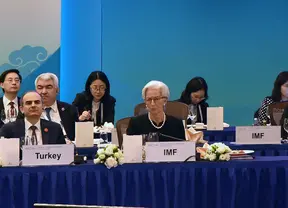
Recent financial volatility has cast a shadow on the Chinese economy, but people need to view the bright side if they want to have the full picture. Chinese officials never deny that the world's second largest economy is facing trouble, it is not easy to deliver an annual growth of around seven percent after three decades of rapid expansion. It is true that China's traditional competitiveness is fading amid rising labor costs and tougher measures to protect the environment, but some western analysts have overstated the case. They expect a hard landing or even a collapse of the Chinese economy, as the stock market rout and weaker yuan fuel such pessimism.

The arrival of September was good news for Italian Prime Minister Matteo Renzi. The month opened with a positive readjustment to the country's economic growth calculations and some long-awaited positive movement with unemployment levels.

China's factory activity continued to lose steam in August, suggesting the world's second-largest economy faces prolonged downward pressure, official data showed Tuesday.

The Chinese economy showed signs of encouragement as the latest key economic indicators improved, easing pessimism stemming from lingering downward pressures and a volatile capital market.

Foreign experts on China's economic development have expressed confidence in China's long-term growth potential after the steep fall of its stock markets on Monday and Tuesday, dismissing claims that China is the cause of economic reversals.

World markets experienced a "Black Monday" rout as anxiety over world economic prospects has been accumulated and fermented recently.

After China's steep fall in stock markets touched off a global selloff on Monday, those who hyped about an imminent "collapse of China" years ago are now predicting "the great fall of China."

As Uber and Airbnb expand in China, homegrown online ventures are already taking a slice of the growing sharing economy.

Despite the tumbling of stock markets, investors should forgo their unnecessary anxiety over China because the long-term prediction for China's economy still remains rosy and Beijing has the will and means to avert a financial crisis.

While the weakening of the Philippine peso, the local currency, is a negative economic indicator, it also has beneficial effects on the Philippine economy, according to economic analysts here.

Recent depreciation of China's currency and its slowing growth pace after years of high-speed development have given rise to questions into the health of the world's second largest economy.

Italy's public debt dropped to 2.2036 trillion euros in June, down by 14.6 billion euros on the record high reached in May, the Bank of Italy said on Thursday. But economists believed that is not a reason to be optimistic because Italy's staggering debt mountain will likely become problematic unless the country's economy can start to grow.

Japan, as the world's third-largest economy, has hit a crossroads as far as the value of Prime Minister Shinzo Abe's economic blend of "Abenomics" is concerned, local analysts hold.

China's economy posted 7-percent growth year on year in the second quarter of 2015, unchanged from 7 percent in the first quarter, the National Bureau of Statistics (NBS) announced on Wednesday.

A senior official at Indonesian Finance Ministry said on Wednesday that the nation's economy is not slowing down despite the fact that it gained 4.71 percent growth in the first quarter this year, or lower than 5.2 percent in the same period last year.

Chinese Premier Li Keqiang's five-day Europe tour will push forward the steady, healthy development of Chinese and European economies, with the help of new ideas and approaches to the two sides' win-win cooperation and common prosperity.

The U.S. Federal Reserve's ultra- low interest rate and quantitative easing policies have widened wealth inequality in the world's largest economy, said Joseph Stiglitz, a Nobel laureate in economics and a professor with the Columbia University.